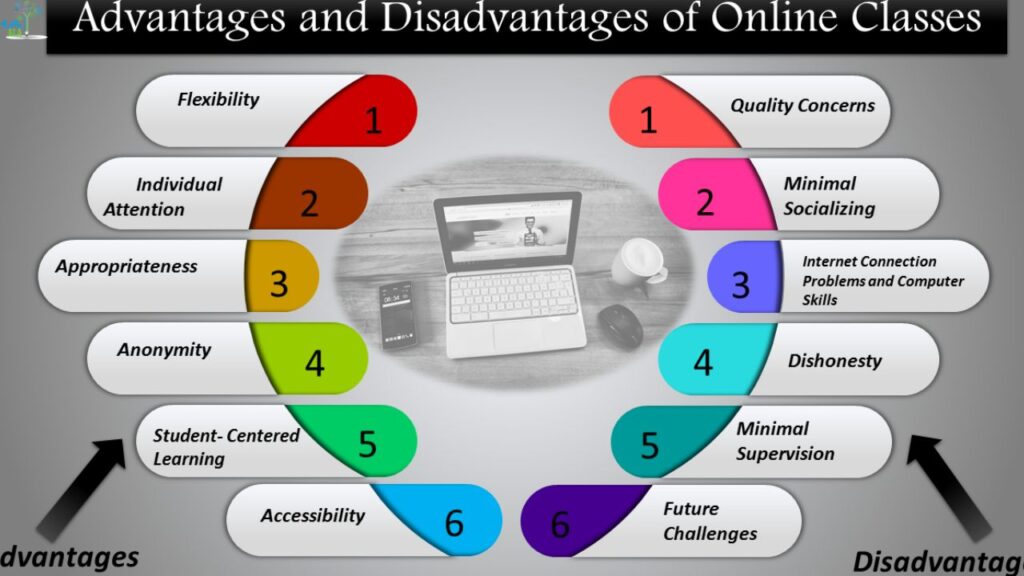In today’s digital age, online learning has become increasingly popular as a convenient and flexible alternative to traditional classroom education. With the advancements in technology, students now have the opportunity to pursue their education from the comfort of their own homes. However, like any other educational method, online learning has its own set of advantages and disadvantages. In this article, we will explore the various benefits and drawbacks of online learning, allowing you to make an informed decision about whether it is the right fit for you.
Advantages of Online Learning
1. Flexibility
One of the primary advantages of online learning is the flexibility it offers. Unlike traditional classroom settings, virtual classrooms allow students to create their own schedules and study at their own pace. This is particularly beneficial for individuals who are working or have other commitments, as it allows them to balance their education with their personal and professional lives. With online learning, you have the freedom to choose when and where you want to study, providing a level of convenience that is hard to match in traditional education.
Advertisement
2. Cost Savings
Another significant advantage of online learning is the potential for cost savings. By pursuing your education online, you can eliminate expenses such as commuting, campus housing, and meal plans. Additionally, online courses often utilize virtual resources, reducing the need to purchase expensive textbooks and course materials. Tuition costs for online programs may also be lower than those for on-campus programs, with various financial aid options available. Overall, online learning can be a more affordable option, allowing you to save money while still earning a valuable degree.
Advertisement
3. Personalized Learning Experience
Online learning provides a personalized learning experience that can cater to individual needs and preferences. With the ability to choose the time and place of your studies, you can create an environment that is conducive to your learning style. Whether you prefer to study in the early morning or late at night, in a quiet room or a bustling coffee shop, online learning allows you to tailor your educational experience to suit your needs. This level of personalization can enhance your understanding and retention of the material, leading to a more successful learning journey.
4. Diverse Course Options
One of the key advantages of online learning is the wide range of courses and programs available. Online education provides access to a vast array of subjects and disciplines, allowing you to explore your interests and pursue specialized knowledge. Whether you are interested in earning a certificate, a bachelor’s degree, or even a master’s or doctoral degree, you can find online programs that cater to your educational goals. This variety of course options ensures that you can find a program that aligns with your interests and aspirations.
Advertisement
5. Interactive Learning Environment
Contrary to popular belief, online learning can offer an interactive and engaging learning environment. Virtual classrooms often include features such as discussion boards, group projects, and real-time video conferences, fostering collaboration and interaction among students. These tools enable students to connect with their peers and professors, participate in meaningful discussions, and receive timely feedback on their work. The online learning experience can be just as interactive as traditional classroom settings, providing ample opportunities for learning and growth.
6. Improved Time Management Skills
Online learning requires strong time management skills, which can be highly beneficial in various aspects of life. When pursuing your education online, you are responsible for managing your own schedule and completing assignments within set deadlines. This necessitates discipline and organization, skills that can translate into other areas of your personal and professional life. By honing your time management abilities through online learning, you can become more efficient and productive, setting yourself up for success in future endeavors.
7. Career Advancement Opportunities
For individuals looking to advance their careers while continuing their education, online learning offers unique opportunities. As online programs provide flexibility in terms of scheduling, working professionals can pursue their studies without having to compromise their current employment. This allows them to gain new knowledge and skills that can be directly applied to their job, making them more valuable assets to their organizations. Additionally, earning a degree or certification through online learning can enhance your resume, showcasing your commitment to professional growth and development.
8. Accessible Education
Online learning breaks down barriers to education by providing accessibility to individuals who may face challenges in attending traditional classes. Whether due to geographical constraints, mobility issues, or other limitations, online learning allows students to access quality education from anywhere in the world. This inclusivity ensures that education is available to all, irrespective of their circumstances. Online learning provides equal opportunities for individuals to pursue their educational goals and unlock their full potential.
9. Continuous Learning
Online learning encourages a lifelong love of learning by offering opportunities for continuous education. With the flexibility and convenience of online programs, individuals can continue to expand their knowledge and skills throughout their lives. Whether you are seeking to acquire new expertise in your current field or explore a completely different subject, online learning provides a platform for ongoing personal and professional development. By embracing online learning, you can embark on a journey of lifelong learning and self-improvement.
10. Technological Proficiency
In today’s digital world, technological proficiency is essential. Online learning equips students with the necessary skills to navigate and utilize various technological tools and platforms. From video conferencing to online collaboration tools, students become familiar with technologies that are increasingly prevalent in the modern workplace. By engaging with online learning, you can develop your digital literacy and adaptability, preparing you for the demands of the digital age.
Disadvantages of Online Learning
While online learning offers numerous advantages, it is important to consider the potential drawbacks before committing to this educational approach. Here are some of the disadvantages of online learning:
1. Lack of Face-to-Face Interaction
One of the primary drawbacks of online learning is the absence of face-to-face interaction with instructors and classmates. In traditional classrooms, students have the opportunity to engage in discussions, ask questions, and receive immediate feedback. This interpersonal interaction can enhance the learning experience and foster a sense of community. In online learning, however, interactions are typically limited to virtual platforms, which may not replicate the same level of engagement and connection.
2. Self-Motivation and Discipline
Online learning requires a high degree of self-motivation and discipline. Without the structure and accountability of regular classroom attendance, it can be challenging to stay on track and complete assignments on time. Procrastination and lack of focus can hinder progress and lead to a subpar learning experience. To succeed in online learning, individuals must possess strong self-discipline and the ability to stay motivated even when faced with distractions and competing priorities.
3. Limited Hands-On Learning
Certain subjects and disciplines require hands-on learning experiences that may be difficult to replicate in an online setting. Fields such as laboratory science, healthcare, and performing arts often rely on practical, hands-on training that cannot be fully replicated through virtual means. While online programs may offer simulations and virtual labs, these experiences may not provide the same level of depth and practical application as in-person learning.
4. Technology Reliance
Online learning is heavily reliant on technology and a stable internet connection. Technical issues, such as internet outages or software glitches, can disrupt the learning process and cause frustration. Additionally, individuals who are not technologically proficient may face challenges in navigating online platforms and tools. It is important to have access to reliable technology and to develop the necessary skills to effectively utilize online learning resources.
5. Limited Networking Opportunities
Networking plays a crucial role in career advancement and personal growth. In traditional classroom settings, students have numerous opportunities to network with peers, professors, and industry professionals. Online learning, on the other hand, may offer limited networking opportunities. While virtual platforms can facilitate some degree of interaction, it may be more challenging to establish meaningful connections and build professional relationships.
6. Potential for Isolation
Online learning can be a solitary experience, particularly for individuals who thrive in social environments. The lack of face-to-face interaction and physical presence of classmates can contribute to feelings of isolation and loneliness. This can be especially challenging for students who prefer collaborative learning environments or who rely on social interactions for motivation and inspiration.
7. Limited Immediate Feedback
In traditional classroom settings, students often receive immediate feedback from instructors through in-person discussions and assessments. In online learning, feedback may be delayed, as assignments are typically submitted digitally and require time for review and grading. This delay in feedback can hinder the learning process and make it more challenging for students to address areas of improvement promptly.
8. Potential for Distractions
While online learning provides flexibility, it also presents the potential for distractions. Studying from home or other non-traditional settings can expose individuals to various distractions, such as household chores, family responsibilities, or the temptation to engage in leisure activities. Maintaining focus and creating a conducive learning environment can be challenging, requiring individuals to establish boundaries and develop effective time management strategies.
Making an Informed Decision
When considering online learning as an educational option, it is essential to weigh the advantages and disadvantages. Reflect on your personal preferences, learning style, and goals to determine whether online learning aligns with your needs. Consider the level of self-motivation and discipline required, as well as your ability to adapt to a technology-driven learning environment. Additionally, evaluate the specific program or institution offering online education to ensure its accreditation and reputation.
Ultimately, online learning can provide numerous benefits, such as flexibility, cost savings, and personalized learning experiences. However, it is important to be aware of the potential drawbacks, including limited face-to-face interaction and the need for self-motivation. By carefully considering these factors and conducting thorough research, you can make an informed decision about whether online learning is the right path for your educational and career goals.
If you are interested in exploring online education options, we encourage you to browse our website to learn more about the programs and opportunities available to you.

